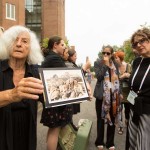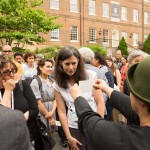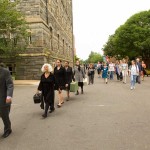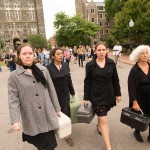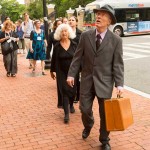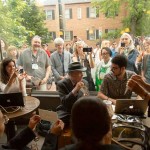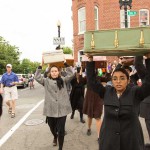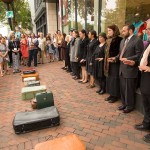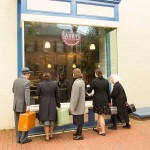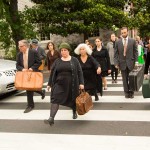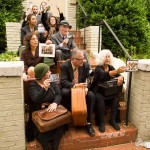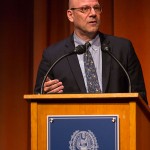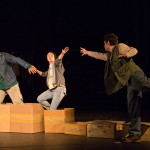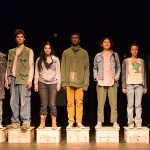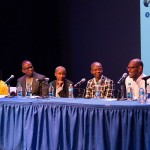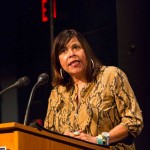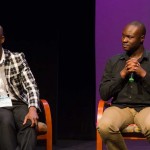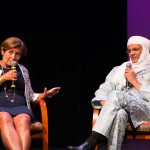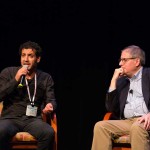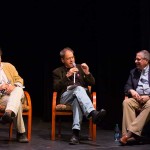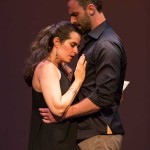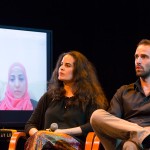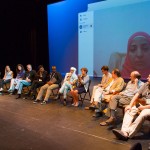Where are you from?
That question was in the air as more than 125 performers, theatre practitioners, policy makers, and students from more than 25 different countries convened at Georgetown University on June 22 for TCG’s Global Pre-Conference in Washington, D.C. But for the strangers from all corners of the globe, the inevitable exchange of names, followed by the seemingly innocuous question about personal origins over morning coffee, seemed to take on a charged new meaning. That’s because the Global Pre-Conference, titled “Finding Home: Migration, Exile, and Belonging,” brought people together to cultivate change, share strategy, and converse about the human rights issues that cross all borders. Besides sharing the temporary “home” of beautiful Georgetown University campus for the 12-hour conference, attendees found a common home base in the shared ideas and beliefs of the theatre—the foundation of what might be called a Theatre Nation (the themed name for the overall 2016 TCG Conference, June 23-25).
The Global Pre-Conference also marked the launch of the Global Theater Initiative (GTI), a partnership between TCG and the Laboratory for Global Performance and Politics (the Lab) at Georgetown University. These GTI partners have joined to serve as a hub of global exchange with three core areas of focus: connecting practitioners with resources, knowledge, and partnerships to strengthen their work; promoting cultural collaboration as essential for international peace and mutual understanding; and innovating new strategies to maximize the global theatre field’s opportunities and impact. GTI also serves as the collaborative leadership of the U.S. Center of the International Theatre Institute (ITI/U.S.).
To kickstart the jam-packed day of programming, Joel Hellman, dean of the Edmund A. Walsh School of Foreign Service at Georgetown University, opened with some harrowing data about the relevance of the conference’s themes and the importance of GTI’s work.
“As many of you may know, or have seen from the last report from the UNHCR, 65 million people are currently faced with the travails of forced migration,” said Hellman. “Forced migration, not voluntary, as a result of conflict, violence, and deprivation. This is the highest number of forced migration ever recorded by the UNHCR. So we are in the midst of a tremendous global crisis.”
Hellman went on to explain that the 36 countries now in active conflict have been in conflict for more than 10 years, and that judging by patterns of economies and growth rates, countries in conflict now are likely to stay that way far into the future. “In 25 years, 70 percent of the world’s poor will be living in fragile and conflict-affected countries.”
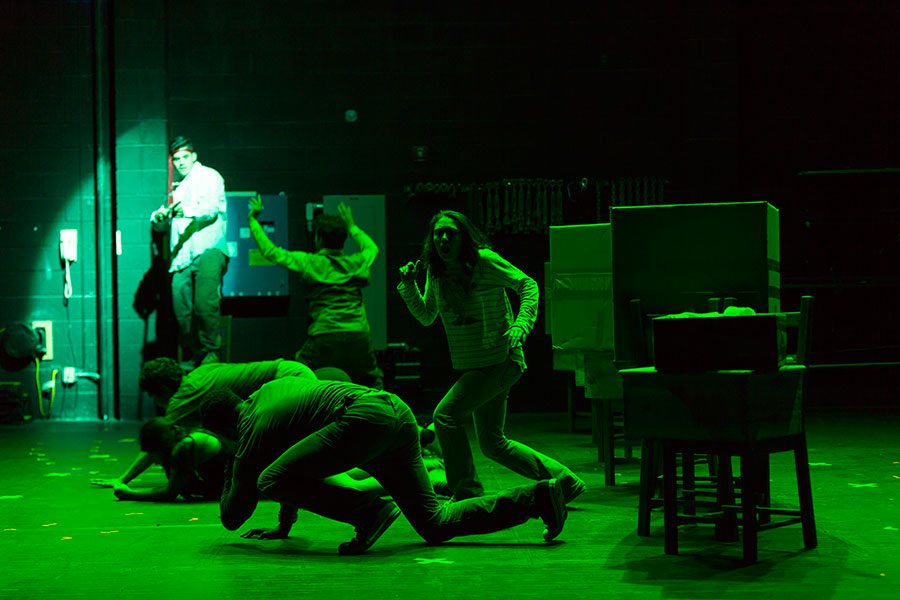
Humanizing the Issues
GTI, along with many of the panelists and performers at the Pre-Conference, promoted the power of performance to humanize these sobering statistics. Exhibit A was a presentation by the CalArts Center for New Performance/Duende CalArts, Shelter. Conceived and written by Marissa Chibas, the movement-based performance that follows a group of unaccompanied minors from Central America as they travel on “La Bestia,” a deadly freight train, into the United States and their eventual passage through the U.S. deportation shelter system.
In a panel titled “Humanizing Exile: A Creative Response,” Wendy Young, lawyer and president of Kids in Need of Defense, corroborated the themes of Shelter.
“We try to help these kids through these proceedings, and what we find is that children who have counsel are five times more likely to be awarded some form of protection and allowed to remain in the United States, and we have over a 90 percent success rate in our cases,” said Young, whose organization provides pro bono legal services to unaccompanied minors as young as 3 years old. Still, she said, “over 50 percent of these kids are going through these proceedings without lawyers.” In comparing the courtroom to the stage, Young said that she testified before the house judiciary committee this spring and told stories from migrant—a format that she thinks has more impact than data and numbers.
Natalia Koliada, founding co-artistic director of Belarus Free Theatre (BFT), joined the conversation from London via Skype because of her own refugee status vis a vis her home country. Skype, Koliada explains, is a necessary tool for artists scattered around the globe to communicate and create work. Having just spoken with collaborator Maria Alyokhina of Pussy Riot via Skype, Koliada reflected on her frequent conversations with a fellow high-profile dissident: “We talk about contemporary artists and their role in different societies, and how politicians use them from both sides,” said Koliada. “We are not heroes, we are not victims, we are contemporary artists—and we are very much interested in different interpretations of exile; because exile for us is a very complicated thing.”
Complicated indeed: Despite having many of its members abroad, the Belarus Free Theatre still operates underground in and around Minsk, teaching and performing weekly. Larry Lynch, director of education and co-executive director of BFT, said, “A lot of what Belarus Free Theatre does in its theatremaking is it collides the micro-narrative story of the real experiences and lives of individuals with big geopolitical shifts and structures—that is a key methodological tactic.”
Added Koliada, “For us, it is not possible to separate what we do artistically and with human rights.”
Storytelling Strategies
The first afternoon panel discussion “Race, Colonization & Art: An Afro-Global Perspective,” was inspired by moderator Sonja Parks’s recent trip to Cuba with TCG and her recognition of the lack of representation of Afro-Cuban culture. Josette Bushell-Mingo, OBE, actress and director, shared some of the ways she is bringing her experience as a Swedish-based British actress of African descent to stages in Sweden. She mounted the first production of A Raisin in the Sun in Sweden this past spring—a “Cinderella complex moment” for Swedes of African descent who, Bushell-Mingo said, were unfamiliar with stories of their own histories onstage.
The problem, she added, is a broader ignorance of African and African-diasporic culture and history.
“I am tired of being invited to the museum of my life,” said Bushell-Mingo. “I am tired of being a guide to my own life. I am tired of being asked to build, to paint, to give stories, to give ideas, to give input—and then I can’t even get into my own museum. I’m tired of it. Regardless of whether I sit on the National Theater or I sit on an independent organization, I don’t want that anymore. It cannot happen anymore.”
Other panelists also shared their tactics and strategies for promoting diversity and sharing African culture around the world. Nike Jonah, also based in the U.K., Skyped in to share her project of creating a mass archive of African-diasporic plays. For director and theatre professor Manuel Viveros of Colombia, diversity is not just about inclusion but about action: He teaches translated African-diasporic plays in the classroom. Director Lloyd Nyikadzino, coordinator of the Zimbabwe Center of ITI, stressed the importance of educating donors and making sure that white benefactors do not dictate the stories onstage.
“Black is not monolithic; there is not one answer,” said Sonja Parks in closing.
Identity on the Page
Next up was “History and Home,” a panel featuring playwrights talking about their experiences in working with themes of identity and belonging, and of weaving social responsibility into their art. Kyoung Park, a playwright of Korean descent who grew up in Chile, recounted working on a project with Chilean teenagers who explored their identity through Korean pop songs. Heather Raffo, an Iraqi-American artist, spoke about her upcoming opera Fallujah, about the Iraq War at seen through the mind and heart of a U.S. Marine. “We find that place where we feel we belong, and it can be anywhere and in any way. I am in pursuit of that, and all of my characters are in pursuit of that—and it is really hard to find,” said Raffo.
The conference wasn’t all talk; there was also some action, albeit of the theatrical kind. In the site-specific performance of Migrar, 14 multidisciplinary artists from the Catalan-based troupe Kamchàtka dressed in bowler hats, long wool skirts, and carrying luggage split off into groups, leading curious attendees down cobblestone streets around Georgetown. One group was led down the steep steps made famous by The Exorcist and into a gas station, where the crowd of “immigrants” following a BMW through the pump led to some confused looks from bystanders. Then the characters stopped traffic as they sat curbside, removed their shoes, and shared tattered portraits with passersby. (Migrar was presented in collaboration with the Institut Ramon Llul.)
The next group of performances were not meant to be paraded in the streets; on the contrary, as indicated by their title, “Prevented/Presented Performances,” these were theatrical works that weren’t allowed to be seen at all in some parts of the world. Dijana Milošević of Serbia’s DAH Theatre discussed her semi-autobiographical piece about dreaming of becoming a ballerina and finding her way to the stage. “Theatre was the place to live the contradiction,” she said.
Peter Marks, lead theatre critic of The Washington Post, spoke to Nabil al-Raee, artistic director of the Freedom Theatre in Palestine, about their play The Siege. The company, formed in a refugee camp, was scheduled to perform at a major American theatre, but plans fell through after months of negotiations. Concluded al-Raee, “Sometimes we think as an artist we are free, but we have to think carefully when we are free.”
This exchange stuck with attendee Raymond Bobgan, artistic director of Cleveland Public Theater. As he said later, “Hearing from Nabil al-Raee of the Freedom Theatre in Jenin was inspiring because he does what we do, and for the same reasons, but he does it at an ongoing personal price. What a gift to be reminded of the privilege we all have in the U.S. to make art, and a real admonition to risk more and stretch more with the resources and safety we often take for granted.”
Actors Leila Buck, Danny Gavigan, and Michael Tolaydo then performed a scene from The Admission by Israeli playwright Motti Lerner, about a massacre of Palestinian civilians during the 1948 war that led to the establishment of the state of Israel. Ari Roth, who has produced Lerner’s work 7 times in D.C., said that simmering challenges to Lerner’s Israeli patriotism led to the cancellation of “The Voices of the Middle East Festival,” and ultimately to Roth’s departure from the post of artistic director of Theater J (he now runs the Mosaic Theater, which recently produced Lerner’s After the War).
Perhaps the most lasting image of the Pre-Conference was that of Syrian refugee Reem Alsayyah projected on the screen in the Davis Performing Arts Center. Joining the conversation from Jordan, Alsayyah spoke resolutely about the Syrian Trojan Women Project, of which she has been part, and which has been creating advocacy projects and therapeutic drama for Syrian refugees in Jordan since 2013, finding that the themes of Euripides’ original tragedy resonate with the experiences of the all-female cast. Though many of actors have dispersed to different countries since the play’s initial production in Amman, Alsayyah is continuing the work and bringing it to the U.K. “When it feels like the world is against you, you must find the strength in your heart and your soul,” said Alsayyah.



